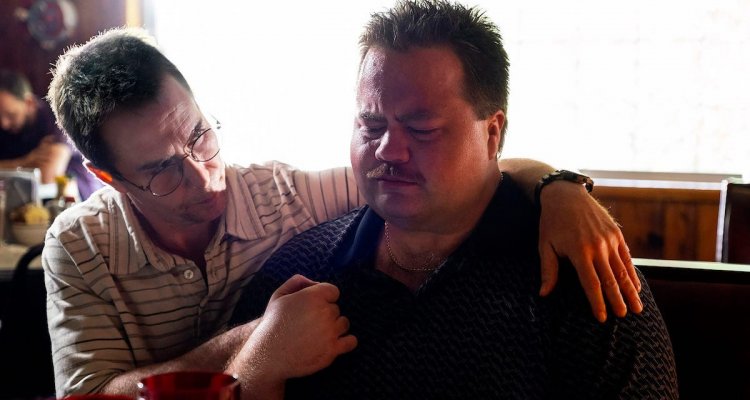A celebration became tragic on July 27th during the 1996 Olympics in Atlanta. That day, with a concert in progress in Centennial Park, a security officer discovered a suspicious backpack and alerted authorities. In that bag, a deadly pipe bomb exploded—wounding 111 and killing two. The security officer’s observant and timely response saved countless lives. His name was Richard Jewell. And in a matter of days, the truism of celebrity marched unchallenged—you either live long enough to be the hero or become the villain. In “Richard Jewell,” Clint Eastwood celebrates a hero in a provocative and troubling tale of journalistic and governmental malfeasance: creating his best film in over a decade.
But before July 27th, Jewell (Paul Walter Hauser) was a nobody. He first worked as a supply clerk at a law firm, where he met Watson Bryant (Sam Rockwell, in a slight change of pace, to say the least)—a loud wisecracking lawyer. They quickly formed a close bond: the clerk regularly replenishing the Snickers in Watson’s desk and sharing games with him at the arcade. That is until Jewell left to become a security guard. By the time 1996 rolled around, he’d been a cop; a member campus police; and now security for the Olympic Games in Atlanta (in the hopes it’ll allow him to return to law enforcement).
To Eastwood’s credit, he doesn’t display Jewell as perfectly cut. Jewell fantasizes about possessing power and authority but lacks the awareness to appreciate such responsibility. He holds no special talent—just an overzealousness for guns and a proclivity for the rule of law. Worst of all, he’s the butt of others’ jokes: a bumbling, yet well-meaning, everyman. Such observations are crystallized as Hauser breathes empathy in a brilliant performance. Though he’s played men like Jewell before in “I, Tonya” and “BlacKkKlansman:” men beyond their designed stations, fated to accomplish nothing, he’s only done so in supporting roles. Here, his glacial voice and placid eyes show Jewell as a tragic stooge whose worst enemy is often himself. Raised ever-so-slightly, only to fall.
And he does fall. Jewell tumbles from hero to terrorist in a span of three days. Nevertheless, we never witness any outrage from the outer world. There are no protestors on Jewell’s front lawn. Instead, there are only two universal villains: the media and the government—presented in the form of FBI Agent Tom Shaw (Jon Hamm) and reporter Kathy Scruggs (Olivia Wilde).
From the outset, the government suspect Jewell is the bomber. His thirst for adulation; his immeasurable love for his mother; and his white maleness profiles him as a “false hero.” A figure who creates catastrophes to demonstrate his courage. An accusation that’s a cruel irony for the would-be everyman. Through Shaw: who believes he’s destined for greatness too—and the FBI’s unscrupulous pursuit, Jewell resembles multiple Eastwood protagonists, like Maggie (Hilary Swank) in “Million Dollar Baby,” Chris Kyle (Bradley Cooper) in “American Sniper,” or Chesley Sullenberger (Tom Hanks) from “Sully.” They’re ordinary people driven to extraordinary feats, usually facing long odds against powerful foes. Those enemies: a distrusting government relying on overreach, is timely in the wake of the current Impeachment hearings.
Nevertheless, Jewell’s life remains relatively calm until Scruggs reports that he may be a suspect. With a single headline, the lives of him and his mother Bobi (Kathy Bates is the acting hero of the film) are thrown into chaos. To represent him, he calls his former friend Watson: now running his own struggling law firm with his cheerful secretary Nadya (Nina Arianda)—who often has the thankless task of saving his client from himself. Because Jewell is a doormat. Most of the time, he’d rather schmooze with law enforcement—even the men investigating him—than appear disrespectful. He’s that desperate for acceptance and friendship. In these moments, “Richard Jewell” is deeply hilarious and unflinchingly human: often showing the myriad of ways Jewell can shoot himself in the foot. It takes several false starts before he’s ready to do what any Eastwood protagonist does: take the unsuspecting odds and fight back.
Unfortunately, how the director portrays the media during this struggle lacks precision. He and screenwriter Billy Ray adapt Marie Brenner’s Vanity Fair article ‘American Nightmare: The Ballad of Richard Jewell’ and create outright fabrications of Scruggs’ character and work ethic. They make her into a fame monster, an untalented journalist who needs to sleep her way into sources. Eastwood gestures to how we’ve lost our trust in the news as unimpeachable through Scruggs, but he distracts by rendering her as a cackling cutthroat woman perpetually lampooning Jewell as a loser. In short, she’s terribly drawn as an outdated sexist cliché. And in the long run, a deep dive into the failings of cable news is left mostly unexplored though tested.
The director’s best asset remains his indelible style. In his films, he usually doesn’t employ much fluff, limiting how often he cuts. Instead, he relies on pans and savvy blocking. That’s imperative in “Richard Jewell,” a steady biopic whose best upticks arrive through patience—like how Eastwood gently zooms-in on Jewell’s dimly lit face, crawling towards innocence and truth, and out to obscurity and devastation. Moreover, during the bombing scene: initially, Eastwood’s camera performs ariel sweeps across the concert’s expansive crowd. Soon, he moves to Jewell—tracking him through the exuberant gathering until he finally turns to extreme close-ups of the backpack: sat in darkness with only a flashlight shining upon it, containing the bomb. The cumulative effort: especially after the explosion when the director exercises handheld low-angle shots—should remind audiences that Eastwood is still a master of tension and release. And though “Richard Jewell” doesn’t always get it right: sometimes dangerously—when it does, it’s telling us that heroism is one-size-fits-all. And it celebrates Richard Jewell’s heroic acts, as they should’ve been all those years ago. [B]

